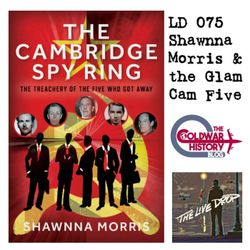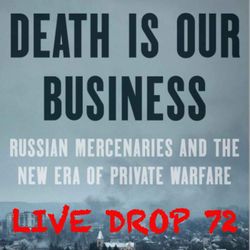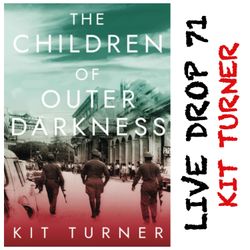Latest episode

75. Shawnna Morris and the Glamorous Cambridge Five
57:20||Ep. 75In this interview, I had the pleasure of speaking with a Cold War expert--Shawnna Morris--about her fascinating book on the Cambridge Five spy ring. We talked about how her book has been received both in the UK and the US, and she shared some insights into the cultural attitudes around this famous espionage group. Shauna guided me through the recruitment storyline, explaining how Philby, McLean, Burgess, Blunt, and Cairncross became Soviet spies, and the social dynamics that let them operate undetected for so long. We explored the complicated personalities of each member—especially Philby’s evolution from idealist to, uhm, sociopath, and the betrayals that marked their personal lives. We also discussed how the legacy of the Cambridge Five continues to influence not just intelligence services, but also the way the story is told in books, films, and archives over time. Shauna reflected on the moral ambiguity at the heart of their actions and how new information continues to shift the narrative. Finally, she shared her excitement about her next project: a book focusing on extraordinary women in Cold War history. Websites:https://coldwarhistoryblog.com/https://coldwarbookreviews.wordpress.com/https://shawnnamorris.com/Here are her socials:https://www.facebook.com/CambridgeSpyRing/https://www.facebook.com/coldwarhistoryblog/https://www.facebook.com/ShawnnaMorrisAuthor/https://www.instagram.com/thecambridgespyring/https://www.instagram.com/coldwarhistoryblog/https://www.instagram.com/shawnnamorrisauthor/https://x.com/CambridgeSpiesThe book is available at Pen and Sword https://www.penandswordbooks.com/9781036108687/the-cambridge-spy-ring/and all major online retailers like Amazon, Barnes and Noble, etc.References:Films about the Cambridge Five across the decades...Philby, Burgess, and MacLean (1977)Blunt (1983) An Englishman Abroad (1987)A Spy Among Friends (2022)
More episodes
View all episodes

74. James Stejskal: Author, Soldier, Snake-eater, Spy
41:56||Ep. 74This episode of The Live Drop, I talk with James Stejskal — a former U.S. Army Special Forces operator from Detachment “A” in Cold War Berlin who later worked in intelligence before turning to history and fiction. He’s the author of Special Forces Berlin and the Snake Eater Chronicles, and his latest books — The Ratcatcher and The Berlin Spy Guide — bring that same mix of lived experience and deep research. We dig into The Ratcatcher, a Berlin spy novel that fuses counterintelligence, crime, and military thriller — following the murder of a CI officer and the hunt for a U.S. traitor--the premise of which comes from a real case buried deep in the Stasi files. James talks about class and culture inside Cold War espionage — Ivy League analysts versus scrappy gumshoe operators — and what it really took to recruit sources behind the Wall. We also get into his research adventures in the archives, Berlin’s Cold War landmarks including a McDonalds, and how today’s Russia mirrors old Soviet tactics through imperial nostalgia and opportunism abroad.James StejskalBerlin Spy GuideRatcatcher of Berlin
73. Thomas Maier Reveals the Invisible Spy
36:24||Ep. 73Episode 73 – The Invisible Spy: Ernest Cuneo and the Secret Machinations of American PowerThis episode visits the untold life of Ernest Cuneo—a professional football player turned journalist, turned presidential fixer, turned invisible architect of wartime espionage. Before the CIA existed, Cuneo was already moving between the White House, British intelligence at Rockefeller Center, and the most powerful media outlets in the country. He leaked, spun, and buried stories. He brokered quiet alliances. He coordinated sabotage, propaganda, and double agents—then slipped back into obscurity.Thomas Maier returns to The Live Drop to talk about his riveting new biography, The Invisible Spy, and the life of the man who helped shape the American intelligence apparatus from the shadows. We follow Cuneo from gridiron glory to Roosevelt’s secret inner circle, through the propaganda wars of WWII and into the paranoia of the Cold War. Along the way, we explore the cost of silence, the lure of anonymity, and how one man’s life reflected—and manipulated—the American century.Wall Street Journal Review, Edward Kosnerhttps://www.youtube.com/watch?v=RAtLXsh4sEghttp://www.thomasmaierbooks.com/The Invisible Spy: Churchill's Rockefeller Center Spy Ring and America’s First Secret Agent of World War II My Substack: Propaganda Lessons from WWII, Mark Valley
72. John Lechner Unveils The Wagner Group
58:40||Ep. 72Author John Lechner talks about his powerful new book, Death Is Our Business, a definitive investigation into Russia’s notorious private military company, the Wagner Group. With firsthand accounts, OSINT research, and a historian’s depth, Lechner traces Wagner’s evolution from covert operators in Ukraine to global players in Syria, Africa, and beyond.The book opens with “Soldiers,” detailing Wagner’s early operations in Eastern Ukraine. The group’s early adoption of hybrid warfare tactics positioned Wagner as a deniable but essential extension of Russian force projection. Lechner highlights Wagner recruits—ex-soldiers, nationalists, and opportunists drawn to war by a mix of belief, desperation, and the promise of belonging.In “Oil Men,” Lechner shifts focus to Wagner’s economic logic. From Syrian gas fields to African gold mines, Wagner leveraged military victories into lucrative contracts. The group effectively bankrolled itself through resource extraction deals, revealing how war and profit became indistinguishable in modern mercenary operations.“Diplomats” explores Wagner’s expansion into the political sphere, particularly in fragile African states. Wagner’s combination of intimidation, diplomacy, and military threat reveals a new kind of state actor: both official and deniable.In “Mercenaries,”The chapter compares Wagner to other modern paramilitary forces and underscores the absence of clear international frameworks for accountability. Wagner’s involvement in human rights abuses and alleged war crimes raise urgent legal and ethical questions about the future of privatized warfare.“Liberators” looks at Wagner’s self-image. The group often justified its operations in Africa and the Middle East as counter-terrorism or anti-insurgency efforts. But beneath the liberation narrative, Lechner uncovers a darker story of extrajudicial killings, systemic abuse, and economic exploitation.In “Heroes,” we get a rare look inside Wagner’s culture. Through interviews and leaked materials, Lechner reveals the motivations behind joining Wagner: nationalism, anti-Western sentiment, pay, and the desire for camaraderie. The chapter explores Wagner’s internal mythmaking—how it crafts a heroic, loyalist identity for its fighters.“Traitors” Lechner chronicles the chaos, the confrontation with Moscow, and the fallout—including Prigozhin’s mysterious death in a plane crash. The group’s fate now remains in flux, with its remnants either disbanded or absorbed into Russia’s formal military apparatus.In the Conclusion, Lechner reflects on what Wagner means for the future. Private military companies are no longer niche actors—they are shaping the modern battlefield.Death is Our Business, John LechnerMy Substack: The Rise, Fall and Legacy of a Transactional Army
71. Kit Turner & A Ragtag Group of Rebels Hit The Shores of Revolutionary Cuba
50:41||Ep. 71🎙️ The Live Drop – Episode 71: Kit Turner on the Cuban Revolution, Espionage, and Historical FictionIn this episode, I speak with former intelligence officer and historical fiction author Kit Turner, whose latest novel Children of Outer Darkness dives deep into the origins of the Cuban Revolution. What begins as a conversation about Kit’s book quickly turns into a gripping exploration of insurgency, propaganda, and the murky world of mid-century espionage.Kit shares how his background in counterinsurgency informed his portrayal of Cuba’s revolutionary figures, from Fidel Castro and Che Guevara to lesser-known but pivotal characters like Celia Sánchez and Vilma Espín. We discuss the revolution’s unlikely beginnings—a leaky yacht and a ragtag group of rebels—and the shadowy support from the CIA, GRU, and KGB during the Cold War chess match in the Caribbean.We also explore the blend of fact and fiction in Kit’s work, including his stylistic influences from Graham Greene, Eric Ambler, and John Buchan, and why historical fiction can sometimes reveal deeper truths than memoirs—especially when you're still under a CIA publication review.📚 Children of Outer Darkness is available via Warpath Press and anywhere books are sold. Illustrated with rare photos, it brings the revolution to life in a way that’s both vivid and unexpected.🔗 Learn more at kitturnerauthor.comCheck out my Substack piece based on this interview: What the Cuban Revolution Can Teach Democrats.More at https://markvalley.substack.com/📚 Books and Authors ReferencedOur Man in Havana by Graham GreeneA classic British spy novel set in pre-revolutionary Cuba. A strong influence on Kit Turner’s writing style and subject matter.The 39 Steps by John BuchanA foundational spy thriller featuring fast-paced action and a civilian protagonist pulled into global intrigue. Turner admired its momentum and structure.A Coffin for Dimitrios by Eric AmblerOne of the novels that helped shape the modern espionage thriller genre. Ambler’s morally ambiguous characters and realistic spycraft inspired Turner’s tone.In the Midst of Wars by Edward LansdaleA memoir by the legendary CIA operative involved in post-WWII counterinsurgency operations, especially in the Philippines and Vietnam. Turner cited this work while discussing how insurgencies are won or lost with people, not just weapons.
70. Digesting Military History with Chris Petty
57:00||Ep. 70My guest is a West Point classmate of mine, Chris Petty, a retired Brigadier General. He created the book and online resource Battle Digest to fill the gap in military history education, offering concise lessons from historic battles. A former Rugby player, he emphasizes how studying history builds battlefield awareness and strategic thinking. Each digest follows a clear structure, covering strategic context, maneuvers, tactical actions, and lessons learned, making evident the principles of warfare. In this episode we discuss pivotal battles like Lexington and Concord, Yorktown, and the Alamo to show how intelligence, deception, and leadership shape outcomes. He points to examples like Washington’s Yorktown feint and the intelligence victory at Midway to stress the critical role of foresight. Reflecting on modern warfare, he emphasizes the importance of drones, intelligence, and learning from missteps in Iraq and Afghanistan. Petty argues that understanding history helps commanders recognize patterns and apply key principles like unity of command. I share a legendary Chris Petty anecdote, whose service and work combine his passion for military excellence with a drive to make military history current and accessible. 12 Battles Every American Should Know, Chris PettyBATTLEDIGEST.COM
69. Spycatcher Eric O'Neill Plies his Trade on Cybercrime
50:17||Ep. 69Eric O'Neill is a leading cybersecurity expert, former FBI operative, attorney, and founder of The Georgetown Group and NeXasure AI — which works with organizations to protect themselves against cybercriminals—whose activity on the dark web constitutes the world’s third largest economy. Eric began his career in the FBI as a “ghost” — an undercover field operative tasked to surveil foreign and domestic spies and terrorists. In 2001, he brought down the nation’s first cyberspy: Robert Hanssen, a 25-year veteran of the FBI and a notorious Russian mole. This story is featured in the critically-acclaimed movie, Breach, and Eric’s book, Gray Day…In this conversation we talk about how "there are no hackers, only spies" and how the crisis of cybercrime has been influenced by the best espionage attacks. We discuss some things you can do right not to protect yourself from cyber threats, some of what's happening on the dark web and how companies like Crowdstrike and Zscaler deploy defenses against cyberattacks. And lastly how cyber mirrors analog operations using trusted insiders and even deploys a familiar sounding tactic called 'honeytraps."Currently, Eric is currently working on his new book, The Invisible Threat: Secrets from a Spyhunter in an AI World (HarperCollins, 2025) coming out next year. Resources and Links: Gray Day, Eric O'NeillThe Invisible Threat, Eric O'Neill (advanced information)EricOneill.netThe Georgetown Grouphttps://x.com/eoneillLive Drop 69
